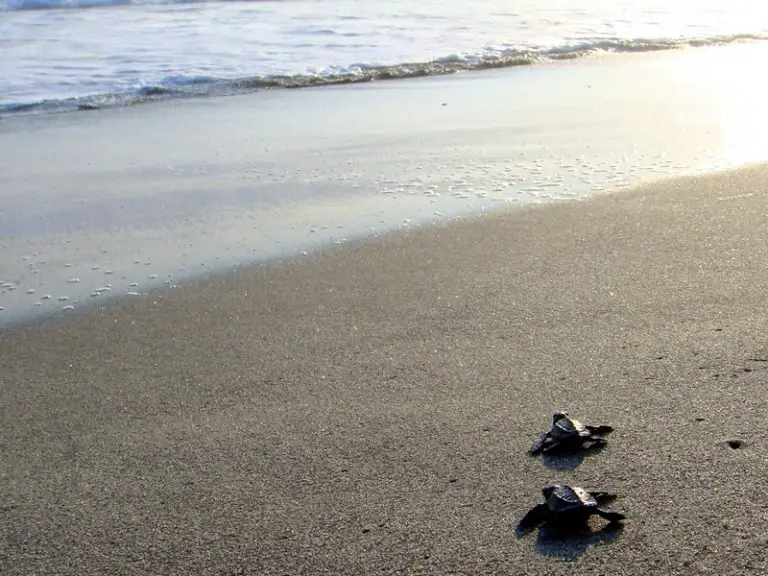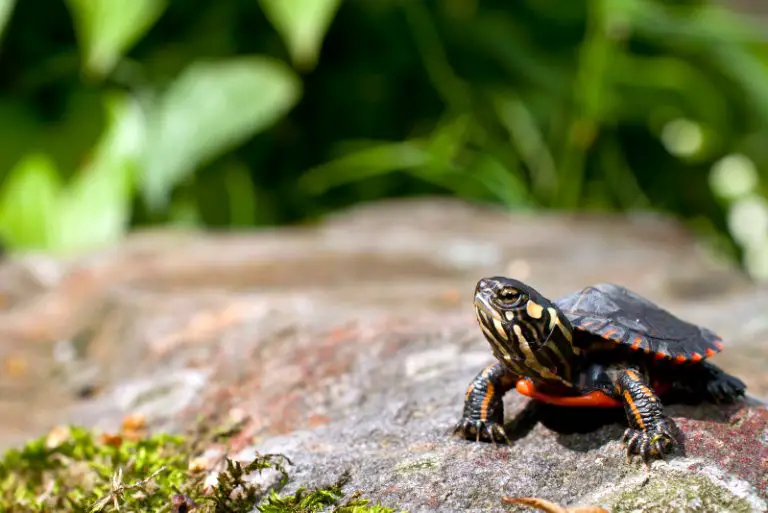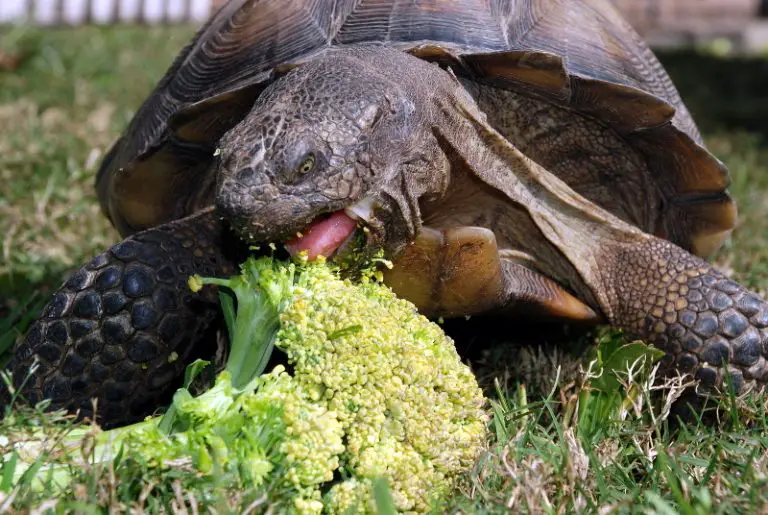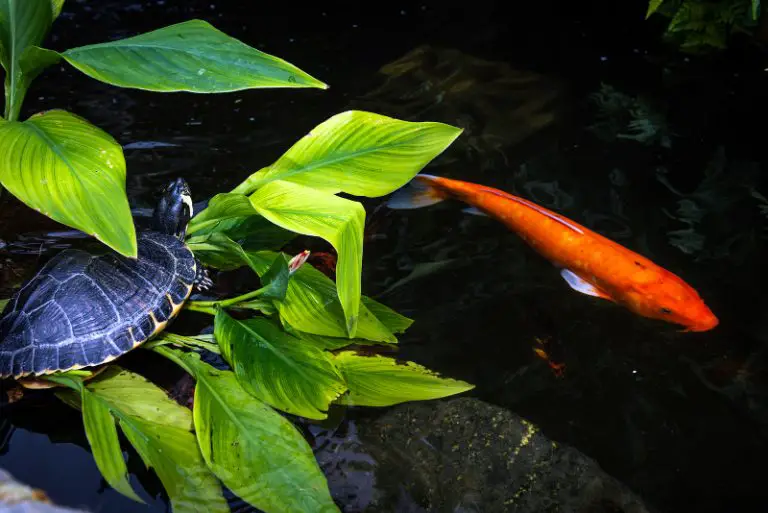Can Turtles Eat Mealworms? [Complete Answer]

Turtles can have a varied diet. Most of them are omnivores which means they can have live food along with various vegetables and fruits. However, what types of foods are safe for your turtle to eat? In this article, we’ll go more in-depth in the topic, Can Turtles Eat Mealworms. For instance, we’ll share what mealworms are and if turtles can (or should) eat them.

Finally, we’ll explain the pros and cons of feeding mealworms to turtles. So, Can Turtles Eat Mealworms? Let’s find out!
Contents
Table of Contents
What Are Mealworms?
Mealworms are a type of worm that you can get at your local pet store. They’re inexpensive and are highly nutritious for reptiles, such as turtles. There are a lot of things to love about mealworms. For example, they contain the following nutrients:
- High water content
- Protein
- Calcium
- Phosphorous
- Fiber
- Vitamins
- Minerals such as potassium, iron, and zinc
In addition, mealworms are easy to care for and gut load so that you can give your turtle nothing but the best. But do turtles eat mealworms?
Can Turtles Eat Mealworms?
The short answer is yes. Turtles can eat mealworms, and it’s healthy for them, too. However, much like everything else, mealworms should only be given to your turtle in moderation.
Most turtles are omnivores, so feeding them mealworms is a good idea to help give them some live protein.
Can Turtles Eat Dried Mealworms?
Yes, turtles can eat dried mealworms. While they don’t sound as nutritious as live mealworms, dried mealworms can give your turtle the nutrients they need as well.
However, you want to find dried mealworms at the store that are non-GMO and don’t contain any additives or preservatives.
Can Turtles Eat Worms?
Believe it or not, mealworms aren’t the only type of worms turtles can eat. In the wild, turtles will eat worms to survive and get the nutrients they need. However, there are a good amount of worms that are safe for turtles to eat.
For example, here are some worms that are safe to provide for your turtle:
- American Nightcrawler
- Bloodworms
- Butterworms
- Earthworms
- Red Wrigglers
- Silkworms
- Waxworms
- Superworms
- Grubs
- Red Worms
- Hornworms
- Mealworms
Which Types Of Turtles Can Eat Mealworms?
So, there are a variety of worms that turtles can eat. However, do all types of turtles eat mealworms?
Believe it or not, mealworms are a good option for many different types of turtles. For example, aquatic turtles, land turtles, and tortoises can eat mealworms. Whether they’re a pet or living in the wild, if they find mealworms, they’ll most likely eat them.
For instance, here’s a quick list of some of the types of turtles that can eat mealworms:
- Snapping Turtles
- Painted Turtles
- Box Turtles
- Red-Eared Sliders
- Map Turtles
- Chinese Pond Turtles
Watch this video: Can Turtles Eat Mealworms?
Can Baby Turtles Eat Mealworms?
Baby turtles can eat mealworms. However, you want to ensure the mealworms are small enough for baby turtles to chew and swallow safely.
If you have only big mealworms on hand, you can cut them into smaller pieces so that it’s safer for your baby turtle to consume.
Read more about what baby turtles eat here.
Are Mealworms Good For Turtles?
Yes, mealworms are good for turtles. However, mealworms should only be fed to turtles in small amounts and moderation.
This worm is highly nutritious for turtles, but too much of these nutrients can have backfiring effects.
Also, turtles are picky eaters. So, if you try giving them mealworms too often and your turtle enjoys them, that might be all they want to eat.
Therefore, they’ll reject their other food, such as fruits and vegetables, that are essential for your turtle to have as part of their diet.
How Many Mealworms Can You Feed Your Turtle?
Pet turtles don’t get as much exercise as they would if they were living in the wild. So, you don’t want them to become overweight and eat too many mealworms.
Mealworms are nutritious for turtles, but too much can backfire. For that reason, you should only give about two to three mealworms per week.
Benefits And Problems With Turtles Eating Mealworms
As with every type of food, mealworms are suitable for turtles as long as they are given in moderation and in small amounts.
There are many benefits to feeding this worm to your turtle, but there are also drawbacks to it as well.
First, let’s take a look at the benefits.
Mealworms Are Highly Nutritious
Out of all the live food that turtles can find in the wild, mealworms (and other types of worms) are the most nutritious.
They are low-calorie snacks that contain many different vitamins and minerals. In addition, mealworms are high in protein, iron, and amino acids.
In addition, mealworms can help turtles grow and develop their shells, repair body tissue, and break down food.
Mealworms Are High In Protein
Protein is essential to a turtle’s growth and development, especially when they’re younger. Baby turtles need a lot of protein to help them grow big and strong.
Luckily, baby turtles can eat mealworms as long as the worm is small enough for them to chew and swallow.
Now, let’s take a look at some of the drawbacks of feeding mealworms to turtles.
Mealworms May Cause Pyramiding
As just stated, protein is great for turtles. However, too much of it can backfire and cause pyramiding.
In a nutshell, pyramiding is also known as protein overdose. Mealworms contain a lot of protein, so if your turtle overeats then they might overdose on protein.
Unfortunately, this cannot be reversed, and it can impact your turtle’s development for life.
Mealworms Have A Higher Phosphorous To Calcium Ratio
Most worms contain more phosphorous than calcium. Mealworms, for example, have a phosphorous to calcium ratio of 2:1.
Turtles, like most reptiles, need a high amount of calcium in order to thrive and be healthy. Phosphorous makes it harder for turtles to absorb the calcium they need. Ideally, they need a diet with a higher calcium to phosphorous ratio.
There is an easy fix to this, though. You can gut-load the mealworms with the nutrients you want your turtle to get. Also, there are calcium supplements you can buy from the pet store. Then, you can sprinkle the supplements over the mealworms topping, so your turtle gets the calcium they need.
For a quick look, check out the pros and cons chart below.
| Pros Of Feeding Turtles Mealworms | Cons Of Feeding Turtles Mealworms |
| High in protein | May cause pyramiding (protein overdose) |
| Highly nutritious | Has a higher phosphorous to calcium ratio |
Conclusion: Can Turtles Eat Mealworms?
Can Turtles Eat Mealworms? Overall, mealworms are a good option to feed your turtle. However, you want to give them in moderation and in small amounts. There are many benefits of mealworms for your turtle, but there are also some drawbacks. You want to make sure that you give your turtle a varied diet so you can be sure they’re getting the many nutrients they need.
To them, they’re getting many tasty flavors. Your turtle will thank you for it later.
Click here to learn if turtles can eat brocoli and here to find out if they eat frogs. Learn more about turtles here.



![How Fast Do Snapping Turtles Grow? [Full Guide]](https://allourcreatures.com/wp-content/uploads/2021/11/snapping-turtle-big-768x513.jpg)



![Can Box Turtles Eat Grapes? [Full Guide]](https://allourcreatures.com/wp-content/uploads/2021/11/eastern-box-turtle-768x513.jpg)